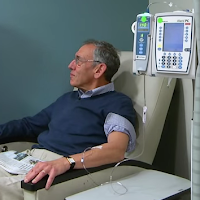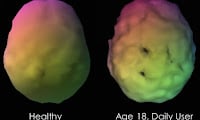CNN VIDEO + INFO:
Amyloid plaque buildup on the brain can begin decades before it actually triggers Alzheimer’s. See how The A4 Trial hopes to clear plaque long before it can cause any trouble.
The A4 study is a clinical trial for older individuals who may be at risk for Alzheimer’s disease. The study aims to prevent the memory loss associated with Alzheimer’s.
Continued below video…
The purpose of the Anti-Amyloid Treatment in Asymptomatic Alzheimer’s study (the “A4 study” for short) is to test whether a new investigational treatment, called an anti-amyloid antibody, can slow memory loss caused by Alzheimer’s disease. Amyloid is a protein normally produced in the brain that can build up in older people, forming amyloid plaque deposits. Scientists believe this buildup of deposits may play a key role in the eventual development of Alzheimer’s disease-related memory loss.
The overall goal of the A4 study is to test whether decreasing amyloid with antibody investigational treatment can help slow the memory loss associated with amyloid buildup in some people.
- CNN.com
- A4study.org












The dipeptide CARNOSINE(it is not carnitine),is a mild heavy metal chelator.Carnosine is found in the muscle of chicken breast and is a natural and safe heavy metal chelator that chelates excess of copper and zinc. We can find Carnosine too in capsules as Carnosine in doses of 80 (eighty) miligrams to 100 (one hundred) miligrams,made in compounding pharmacies(only under physician prescription).The article of Dr Simon Drew at the University of Melbourne shows that copper excess leads to damage to the brain .The interesting article of dr.George Perry and dr.Mark Smith with the title "Carnosine: a Versatile Antioxidant and Antiglycating Agent.",as dozens of others articles,proves,in small doses,Carnosine is a Safe and Natural copper chelator and chelates others heavy metals.We have just to "link the dots"between the articles…
In the article with fhe title "Discovery about brain protein causes rethink on development of Alzheimer’s disease", we can read that an international team of researchers, led by Dr Simon Drew at the University of Melbourne and Prof Wojciech Bal at the Polish Academy of Sciences, has revealed that a shorter form of Beta Amyloid may act as a sponge that safely binds a metal that can damage brain tissue when it’s in excess.(betamyloid actually can be neuroproctetive and to use betamyloid cleaners can be even harmful (?)).
We can find the brilliant articls from Melbourne University searching in Foogle with the title :
"Discovery about brain protein causes rethink on development of Alzheimer’s disease"
Lilly company made a lot of "noise" about it supposed "breaktrough" (or a "smart" marketing try?) with the Failed drug solanezumab (that Lilly has fail over fail in ALL trials with such drug).
Solanezumab as others "zumabs", is based in the falacious and flawed betamyloid hypothesis.
But searching in Google , we can find the very interesting article published in the British Medical Journal (BMJ) , where we can read the well fundamented text of the doctor Margaret McCartney in the BMJ , commenting the media (marketing) release that Lilly pharma company made all that "noise" about the failed solanezumab .
About it , the prestigeous doctor Margaret McCartney , based in scientific logic or in rational thinking made this actually clever observation in the article in BMJ : "This is no breakthrough. How did this paper score such extraordinary publicity? "
We can find the article of the British Medical Journal , searching in Google with the words of the title of the article :
"Margaret McCartney: The “breakthrough” drug that’s not been shown to help in Alzheimer’s disease"